Will Lin-manuel Be in Hamilton Again
A tour halfway through Tick, Tick ... Smash!, the new movie directed past Lin-Manuel Miranda, the patrons of a diner in 90s New York all turn to the camera and sing. The movie, Miranda'due south directorial debut, is based on the autobiographical stage evidence of the same proper name by Jonathan Larson (creator of Rent) and tells the story of Larson's late 20s as a struggling writer and waiter. Andrew Garfield is extraordinary in the lead, but it's the people around him who make this particular scene; as the number unfolds, information technology becomes apparent that every extra in the diner is a legend of musical theatre, from Bernadette Peters, to Brian Stokes Mitchell (a veteran Tony laurels winner), to Roger Bart (original bandage, Tick, Tick ... Nail!), to Jim Nicola (artistic director of the New York Theatre Workshop) to a blink-and-yous'll-miss-it shot of Joel Grey, chasing the waiter for the pecker. "I don't know that I'm the guy yous hire to make your next Marvel movie," Miranda says, speaking via video from his function in uptown New York, "but I am the guy you hire to make this musical nearly a guy who wrote musicals." Information technology is simultaneously funny, moving and monstrously cocky-indulgent – or, as Miranda puts it, "about as musical theatre nerdy equally it tin can become."
Imagining Miranda equally the steward of an alternate Curiosity universe – Comic-Con, only for musical theatre geeks – restores him to what, prior to the opening of Hamilton in 2015, was his quieter function in the cultural landscape: as the champion of a much-loved, much-mocked art grade that rarely troubled mainstream popular culture. Hamilton changed all that. The show not merely won 11 Tonys, a Pulitzer, and more than $850m in box function receipts, it conferred on Miranda a singular condition, variously crediting the 41-twelvemonth-erstwhile with reanimating history, diversifying Broadway, and provoking children all over the world to memorise large chunks of lyrics almost America's revolutionary politics, some of them concerned with the restructuring of the national debt. ("Hey yo, I'thousand but like my state / I'g young, scrappy and hungry / And I'k not throwing away my shot" – all the same being hammered out at a million barmitzvahs). The virtually surprising matter nigh all this, perhaps, is that Miranda, appearing today in his customary flat cap and goatee, has the boundless enthusiasm and apparent absence of cynicism of the aspiring artist withal untouched by success.
If you had to discover the antithesis to Hamilton, Tick, Tick … Boom! – a piece of musical theatre of outlandish obscurity – would be a skilful place to start. The testify, written in 1990 as Larson turned 30, his 5th year as a waiter at the Moondance diner, was never produced across an off-Broadway read-through in 2001. It is small in scale, telling the story of Larson's failure to find a backer for one of his earlier musicals, as well every bit his hard relationship with his girlfriend and their life in the grungy downtown neighbourhood that would later on provide him with the foundations for Hire. That testify, which opened off-Broadway in tragic circumstances in 1996, was the project Larson began writing after Tick, Tick … Boom! failed to get off the ground. When information technology reached Broadway afterward that twelvemonth, its touch on was like in scale to Hamilton'south, 20 years later. Rent ran for 12 years and fabricated more than than $270m at the box office.
Tick, Tick … Nail! is not the story of how Larson wrote Hire, or rather, non direct. If its premise sounds unpromising – I'k a big fan of musicals, and even I hesitated – to Miranda, it seemed the perfect project for his directorial debut, a mode to celebrate Larson and create a broader portrait of the artist as a young man; in particular, how years of sunken cost and effort can predate an artist's big hit. Miranda saw Hire as a teenager, when it first opened in New York, an experience so profound that he sees Larson's biography every bit inextricably linked to his own. "That'south the guy who got me writing musicals," he says. "Rent was when I inverse from liking musicals and existence in the school play, to thinking I could actually ane day write one. It was truly the start contemporary musical I had ever seen – this story that took place in the Hamlet, about artists trying to survive, deciding whether to stick with what they're doing, living and dying. And information technology just felt like, 'Oh, anyone's allowed to write a musical?'"
Inspired by Larson's example, the musical Miranda ended up writing was In the Heights, the testify that launched his career on Broadway at the age of 28, which he says has "a lot of shared DNA with Rent". Unlike his hero, Miranda did not have an extended period of failure when it seemed foolish to keep writing, but other than that, the parallels between the two men are strong. Both lived in New York neighbourhoods concerned with "fighting gentrification": 1980s SoHo in Larson's case, Washington Heights in Miranda'due south. Both believed that "popular music and theatre music tin can be friends" – Larson tipped towards stone, while Miranda incorporates the Latin, popular and hip-hop of his upbringing. Both were straight men in a genre latterly dominated by gay ones, and both were mentored, a generation apart, by Stephen Sondheim, who appears in Tick, Tick … Nail!, played with uncanny accurateness past Bradley Whitford. (After watching an early cut of the film, Sondheim told a nervous Miranda, "you treated me gently and royally, for which I am grateful").
Larson's score riffs on Sondheim's Sunday in the Park With George, some other musical about the artistic process, and if the music is less ersatz than Rent's, 1 suspects information technology is in part thanks to this influence. The main reason for the moving picture's success withal, is Garfield, who is sensational as Larson, by turns maniacal, crushed, furiously hopeful and heading, as most in the audience will know, towards an early expiry at the age of 35, from an aortic aneurysm he had the night before Hire opened off-Broadway.
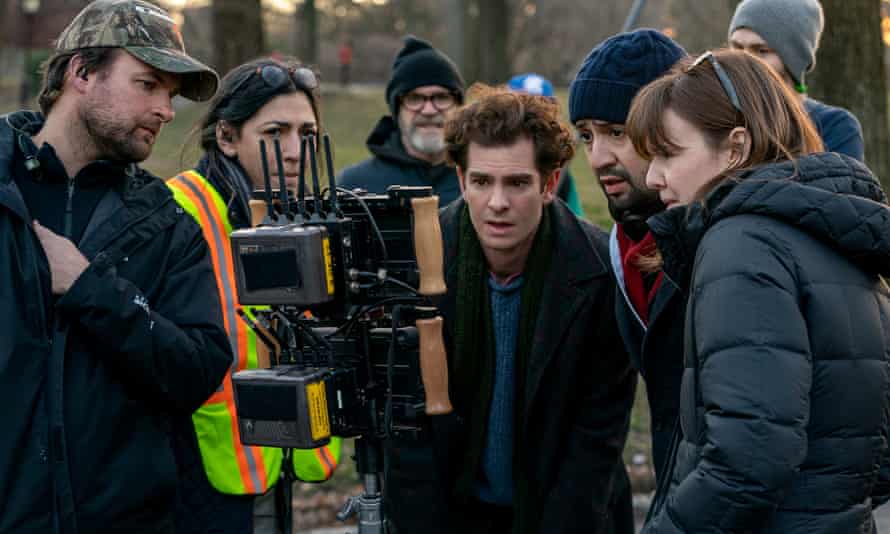
Miranda had seen Garfield on phase iv years earlier in the National Theatre's epic product of Angels in America, Tony Kushner's bear witness set during the Aids crunch in the The states in the 1980s. "He carried the hardest office of a six-hour play," Miranda says, and it occurred to him that night that, if he ever got Tick, Tick … Boom! off the ground, this was the man to play his hero. "I remember cocking my head to one side and thinking, 'Can I come across Jonathan Larson there? Maybe with a perm?'" There is a physical resemblance – "I retrieve they share a gangliness, which is helpful" – but information technology'due south the ability of the performance that makes the men seem in tune. "I recall that Andrew tin can do anything."
It's a feature of Miranda's post-Hamilton career, of course, that for a few years he, likewise, has been able to do anything, and the fact that, apart from reheating In the Heights for the screen, he has largely pivoted away from Broadway towards Disney, taking on acting roles (Mary Poppins Returns) and collaborating on big Disney soundtracks (Moana, the forthcoming The Footling Mermaid), has invited some sniffy commentary along the lines of: Sondheim would never accept done that. It's a tension addressed in the movie – the conflict betwixt fine art and commerce; what constitutes selling out – that Miranda finds largely amusing. He has, he says, always accepted work on the basis of what any individual project might teach him, and said yep to Poppins, for example, for the chance to piece of work with managing director Rob Marshall.
Only in whatever case, he invites those judging to put themselves in the place of the struggling immature author, braced for years of disappointment then that if success finally comes, he has perhaps earned the right to say yes to everything. In 2001, while Miranda was even so at higher, he saw that off-Broadway product of Tick, Tick … Boom! and it felt, he says, "like watching a message in a bottle. It was like, 'Hey? You're graduating with a caste in theatre? Good fucking luck!'" He bursts out laughing. "And gauge what? Those people you're sitting with, who are so talented and are likewise theatre majors, they're going to grow up and get a real job and you're going to be the just motherfucker banging your head confronting a wall. Are yous ready for that?"
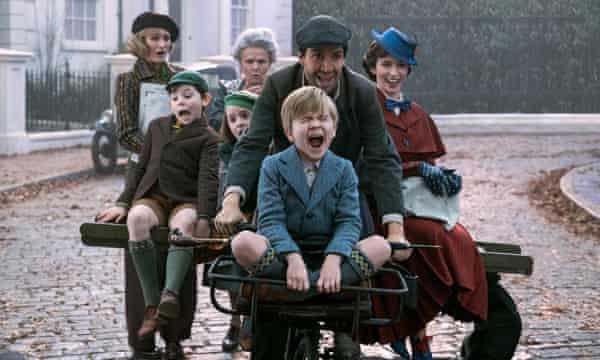
L in-Manuel Miranda's temperament is famously chill. He's not a tantrum-thrower, or a diva. He is, past reputation, a nice guy, approachable, self-deprecating and uxorious (his wife, Vanessa Nadal, was at school with him), who wrote the bulk of Hamilton while wandering around his neighbourhood or riding the subway to Brooklyn. This equanimity, which in the get-go flush of success contributed to Miranda'due south popularity, inevitably later became a target for satire. Hamilton was so loved, so lauded and for a while then universally nowadays across every medium, that Miranda's affable dorkiness – his Joe Biden-levels of folksiness – started to show upwards every bit snarky TikTok memes (many riffed on Miranda's omnipresence, pasting him, Where's Wally?-manner, into every believable background, or mocking what students of his acting divined to be his single doleful, facial expression). The prove itself, meanwhile, was criticised for being insufficiently tough on the founding fathers' involvement with slavery, and the movie version of In the Heights was slammed past some commentators for casting light-skinned over Blackness and Afro-Latinos. Miranda humbly accustomed all charges and promised to larn from them. Just the bloom had come off the rose.
The truth is that with the exception of a petulance he admits comes over him when a producer or collaborator sends him notes on his work – "my back tin become up" – he is pretty even-tempered. Does he have a particularly stark example of this petulance? He does. "We were working on In the Heights and they brought in a mentor composer, Andrew Lippa, who is great. At one point he goes, 'Are all of your songs in 4/4?' And I go, 'Yep.' And he goes, 'Yes, that's a problem.' And I went, 'Alibi me?' He said, 'You demand some rhythmic variety, because I felt it.' I left that coming together cursing him out." An hour subsequently, Miranda says, "I was sitting nether a tree going, 'Oh god!' And I immediately made a decision to put all of Nina's songs in 3/iv – to make her literally, rhythmically out of step with the residue of them. It was a great notation, to which I reacted with remarkable hostility."
Miranda has no formal music grooming. He learned pianoforte every bit a child and cobbled together enough musical expertise while at college to enable composition (his arranger, Alex Lacamoire, carries a lot of the weight for the Hamilton score). Miranda's family unit, immigrants to the United states from Puerto Rico, had a theatrical streak – yous but have to expect at the video of his nuptials, during which he leads his family through a choreographed rendition of To Life, from Fiddler on the Roof, to run across what a showman his father, Luis, is. (Vanessa expected her new married man to pull some theatrical number, but had no idea how far it would go. "It'south when she sees her brother – who'due south in real estate – get up and start line dancing with u.s., that she really starts bawling," Miranda says).
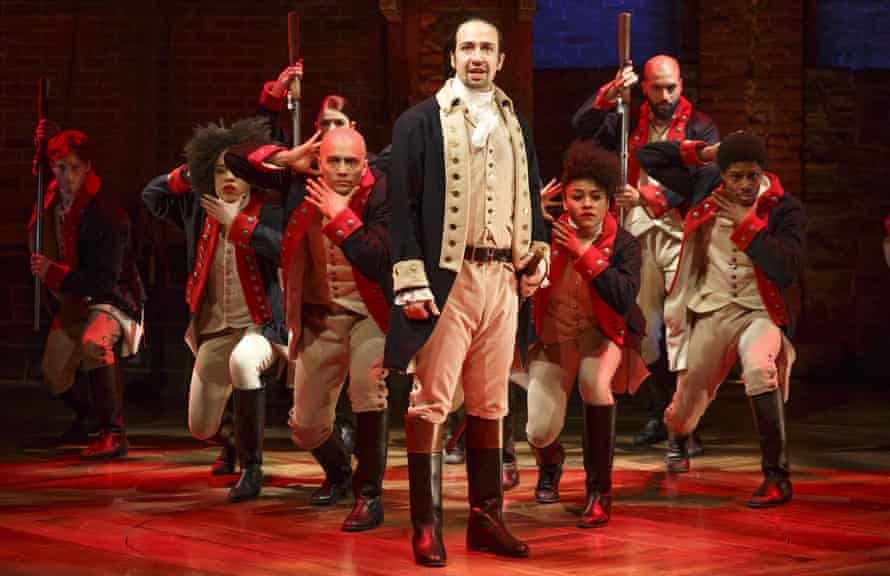
Luis Miranda spent his working life as a political consultant, and is characterised past his son as a "scrap of a frustrated creative person", who idea music and writing were all-time left every bit hobbies. "He had an uncle in Puerto Rico who was a honey theatre player, just my dad's just too practical to make a get of that." Miranda smiles. "Lo and behold, he has this son who has no such practicality. I e'er think of my grandmother, who under her breath, every time I was drawing something or making something, would say, 'That boy and his inventions.'"
His parents weren't discouraging, exactly. But both Luis, and Miranda's mother, Luz, a psychologist, wanted him to apply to law school after college as insurance. This is where, Miranda says, the Panamanian singer Rubén Blades "messed upwardly the curve for everyone. Because Rubén Blades, who is one of the smashing Latin songwriters and an incredibly accomplished actor, also went to Harvard Constabulary School. So my dad would be similar, 'Rubén Blades! Rubén Blades!' And I'm similar: 'I'chiliad not as smart as Rubén Blades, it'southward not going to happen.'"
The force per unit area was real and Miranda, a conscientious son, had to summon real backbone to resist it. At the same time, he says, his parents never missed a show. During his first year at college, Wesleyan University in Connecticut, where he was emphatically not studying police, he was cast in a student production of Jesus Christ Superstar. Miranda blanches at the retention. "They had to hold the curtain," he says, "because my dad's bus of 40 people from New York was late. And they were like, 'Nosotros're belongings for the Miranda motorbus!' while I'thou mortified, in the wings." Miranda assumes the wide-eyed, stricken face of a teenager wishing the floor would open up to eat him. "Simply they were always supportive in terms of showing up, even when they were scared for me."
Miranda started writing In the Heights when he was 19 and still in his showtime yr. Information technology would, he says, probably have gone nowhere – if things had been slightly different, Miranda might, like Larson, have had 10 or more years in the wilderness before a hit – had he not met Thomas Kail, a director several years alee of him at college. The pair but met, through theatrical circles, later both had graduated, merely something in the quality of the collaboration pushed Miranda forward. "When I met Tommy Kail, I met someone who was much smarter than me, who I enjoyed collaborating with, and made deadlines for me. And also someone who was not focused on where the end product would become. I don't think Tommy and I said the word 'Broadway' for the first iii years of our collaboration. We'd be similar: what else do we demand to exercise? We need to make the best show we can, and not worry near where it's going."
From a technical point of view, in that location are probably better songwriters in the globe than Miranda. His existent skill, across his originality, lies in an ability to communicate huge volumes of feeling via small, often superficially dry out transitional moments in a vocal. In one minor example from Hamilton, it remains mysterious how, exactly, Miranda manages to invest the phrase "the Hamiltons move uptown", from a song nearly the loss of Hamilton'southward son, with more emotion than is managed in many entire two-hour musicals. Whenever you render to the show, it hits you anew; the pure impact of the score, the imaginative feat not but of putting himself in the shoes of the 200-year-onetime architects of modern America, but of the father grieving for his child. Miranda had no template for that. Information technology remains, as a piece of writing, a staggering achievement.
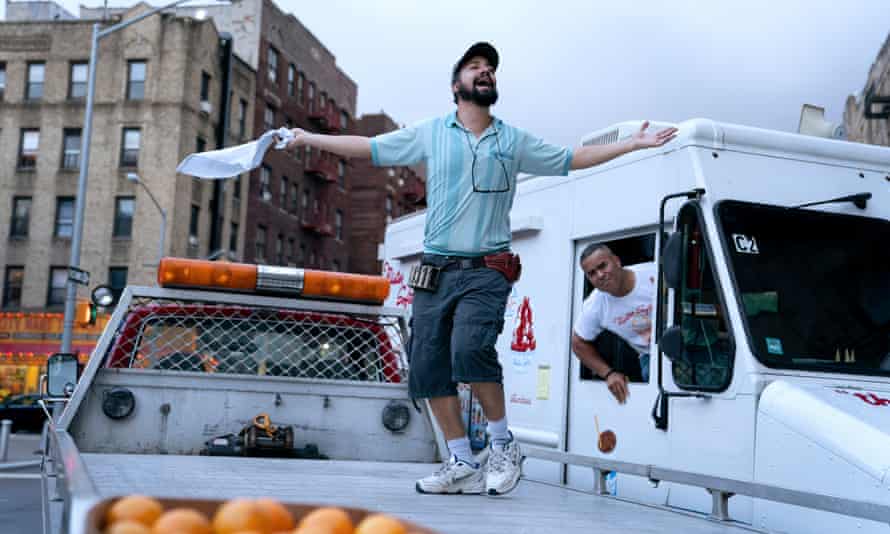
He has been helped, Miranda says, by Vanessa, whom he calls his "home field reward". Although the 2 were at the same high school in New York, they only met and started dating after college, when Vanessa was a scientist at Johnson & Johnson. She later enrolled at MIT to study chemical engineering, before eventually becoming a lawyer – she now works in cosmetics law – and more than a decade afterward their wedding, Miranda remains in awe of her existent-world skills. She does not, he says, "really care most musicals. She likes good ones, only she doesn't like any one-time musical. They accept to be adept. I will lookout anything; I think the worst musical is better than a good movie." Hamilton would not, he says, nix along with the footstep and energy it does, were information technology not for Vanessa. "Considering if it took too long she'd be like …" he drums his fingers on the desk.
The coulple have two immature sons, Sebastian, 6, and Francisco, iii, and in the early years of their matrimony, Vanessa was the breadwinner. The frustration of this arrangement is one addressed in Tick, Tick … Boom! – the habit of content creators to disappear into their own heads effectually deadlines, and to use everything around them equally grist. Whereas Larson'due south girlfriend Susan understandably rails at him for never being fully mentally present, Vanessa is unusual, Miranda says. "When nosotros started dating, I felt no self-consciousness about writing in front of her – and what I look similar writing is crazy." He makes a wild face. "Information technology's me putting on the character until I'yard telling the truth; that looks like a person talking and singing and screaming to themselves. And she was totally not fazed past that."
In that location's one scene in the film when Larson, mid-hug, starts absent-mindedly doing air-piano on Susan's shoulder, writing a song in what is supposed to be a tender moment. She goes bananas. It was a management that came from Miranda, which he calls "a chip of a muddy laundry matter for writers – the mic's always hot if you live with us. Sondheim said information technology better than anyone – in that location's a part of you lot always mapping out a sky. For any writer, in any form, in that location'south a part of you that'south living, and a part of you lot that has a tape recorder on: think this for later on." Even that, he says, doesn't faze Vanessa. Miranda tries to be present for his children, which entails making certain "I tin can carve out writing time". Just when Vanessa saw the scene with the air piano, she told him she would never blow up every bit Susan did. "She said, 'If you had an idea for a song, I'd say I'1000 glad you got something useful out of this fight nosotros had'; it wouldn't exist, 'Fuck yous for writing while we're fighting'; it would be, 'Well, something's come out of this'." She sounds like a saint.
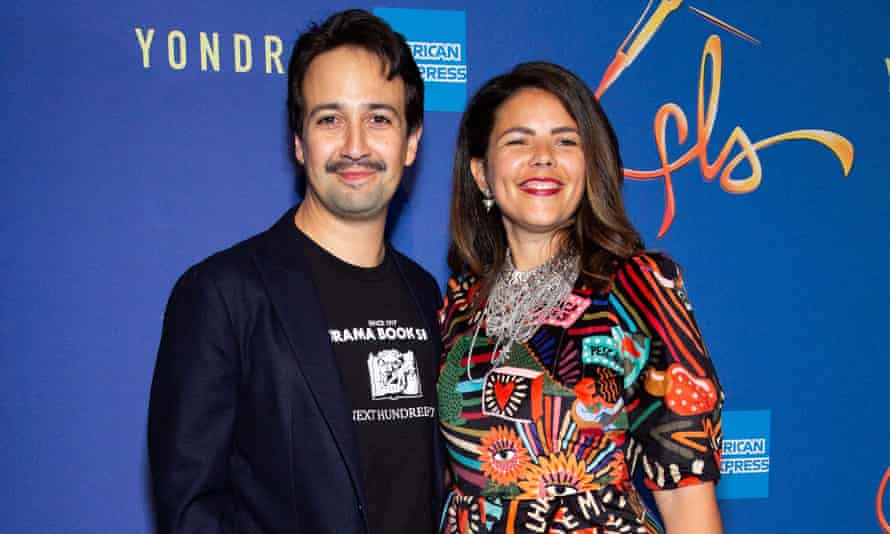
Another strand of Tick, Tick … Smash! is how difficult information technology is for writers to spend years on a single project without seeing the affair to fruition. Miranda felt that keenly with In the Heights, he says – "the feeling of I'm-going-to-explode if this giant matter that simply exists in my encephalon doesn't get out of my encephalon on to a stage". But it was the wearisome-going early stages of Hamilton that actually got to him. Subsequently reading Ron Chernow'due south biography, Miranda had decided to adapt it as a musical and was, in the first instance, partnered with a playwright. Information technology was hell, he says, "the feeling of being already besides pregnant with the work" to have to wait for the busy playwright to be costless. "I had done all the research and it was starting to distil and I had that impulse that I just need to become writing – I can't worry about lining upwards with this playwright and figuring out how to prepare this. I've just gotta go."
In the stop, he ditched the co-writer and wrote Hamilton singlehandedly, which in a different author, might indicate issues with collaboration. This isn't the case with Miranda, who is then far from the stereotype of the gruff, ornery genius that it can be tempting – unfairly, I recall – to read his real talent every bit marketing. I of Miranda's advantages is an power to admit to not knowing things, and to accomplish out and enquire for aid. For Tick, Tick … Boom!, Miranda says he picked up the phone and called on every passing friend and associate better qualified at directing than him, who had always casually offered advice. "Edgar Wright, Ava DuVernay, anyone who I'd met on my travels. I called Tommy [Kail] and Jon [Chu] a lot. I called Rob [Marshall] when I was planning and storyboarding, because Rob is the best storyboarder."
Miranda is and so endlessly, boundlessly sunny about everything, y'all starting time to wonder if there's annihilation he hates. In the new moving picture, Larson takes a crack at the parlous land of Broadway as exemplified past Cats, but Miranda won't knock Andrew Lloyd Webber. (He recently saw Phantom of the Opera, now that Broadway has reopened. "Information technology was great!" he says. "In that location were all these alums in the audience, and I talked to a gaggle of Christines who said they've never seen the bear witness looking so clean or the choreography this precipitous. In that location's never been a better time to come across theatre, because everyone had to starting time from scratch.")
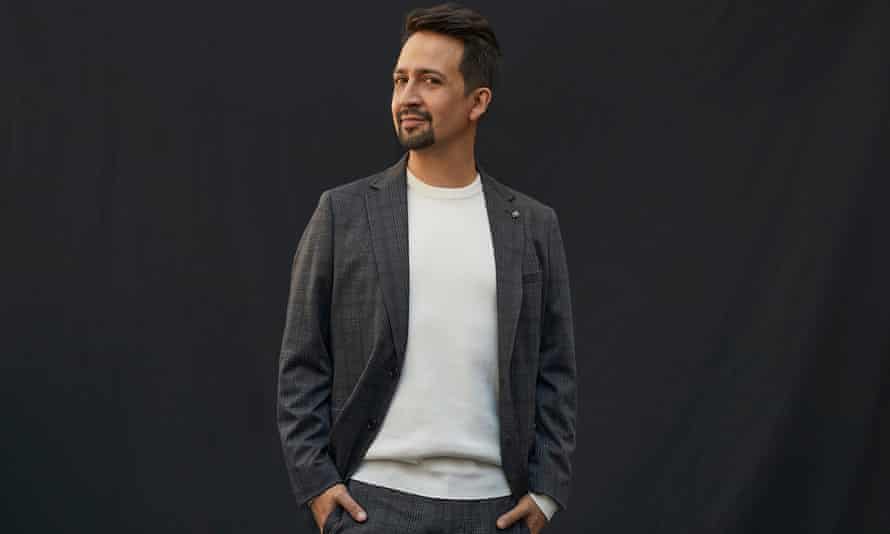
OK, but in that location must exist something – anything – he really despises? He thinks, hard. "I have dislikes within the genre. Like, I'm not good at meta musicals. I don't love a musical that makes fun of the fact that it's a musical. That'southward my personal taste; I'm similar, don't apologise! Y'all similar musicals, too, otherwise you wouldn't be writing one. I don't similar things that apologise for what they are. So when a musical'southward similar, 'We're singing a song, isn't that crazy?!' I'1000 like, 'No; I came to see a musical, it's not crazy that yous're singing a song. Sing the fucking song'."
This is a very satisfying rant, only it is, of course, delivered with pitch perfect adept humour. On the subject of Disney, Miranda says it's "super scary" writing music that will, if information technology succeeds, exist congenital in to children's memories, where information technology will stay for e'er. "With Moana, I was the last guy hired, and I was also working on Hamilton at the same time," and these things are scarier than usual, he says, "because you know yous're going on a playlist with [The Little Mermaid's] Office of Your World, and [Frozen's] Permit information technology Go. That's tricky company to be in." How did he calm himself? "You know what I did, really? I was working Tick, Tick … preproduction and Mermaid at the same time, and at the same time that Heights was shooting. And the way that I psyched myself out was to tell myself: I'one thousand back in higher; these are all just courses I'grand taking."
What?!
"Yeah. I'one thousand doing an internship with Alan Menken [who wrote songs for The Little Mermaid, and worked with Miranda on Tick, Tick … pre-production]; I'm doing my Columbia history project [with Hamilton]. If I remember of it as classes, and projects, they feed each other rather than, 'Oh god, I have so much work to do.' I retrieve of it equally cantankerous-curriculum; I'm getting a very well-rounded teaching." During the heights of the craziness around Hamilton, he was saved past an almost polar opposite mental pull a fast one on, which was intense, singular focus on the show. "Doing information technology every night became my meditation. For 2 and a half hours, I only have one job. That saved me, because I couldn't go and political party, I couldn't become to half the things I was invited to; I was like: no, I have 2 shows on Sat, which kept my head from getting off the swivel. Being in a Broadway show is like being a cook in a restaurant; they don't care about how much people liked it concluding night, it'southward about this night."
Is he relieved no longer to be the hot young thing? Miranda looks taken aback. "In terms of no longer beingness the hot immature thing – to apply your words, and I actually appreciate that – I call up it is very surreal to be on the other side of Hamilton, and realise that for some people my proper name is synonymous with musical theatre." It seems absurd to him that the opinion of the kid from Washington Heights has so much sway, "but I attempt to take whatever that is in the nearly responsible way". This means promoting those with less exposure than he has, every bit Sondheim once helped him forth. In that spirit, he says, "I went to [Douglas Lyons' comedy] Craven and Biscuits yesterday, it was great, and I laughed my ass off and you should get see it." He as well raves well-nigh Ruben Santiago-Hudson's Lackawanna Blues and makes a short oral communication most how rubber, with masks and vaccine mandates, information technology is to visit Broadway and "gather in the night to see a show". Miranda looks briefly surprised. And then he smiles, and starts laughing at the sheer improbability of information technology all. "I've become an elderberry statesman."
This commodity was amended on 22 Nov 2021 because Jim Nicola was described equally former artistic director of the New York Theatre Workshop. He remains creative director until June 2022.
Source: https://www.theguardian.com/stage/2021/nov/20/lin-manuel-miranda-hamilton-saved-musical-theatre
0 Response to "Will Lin-manuel Be in Hamilton Again"
Post a Comment